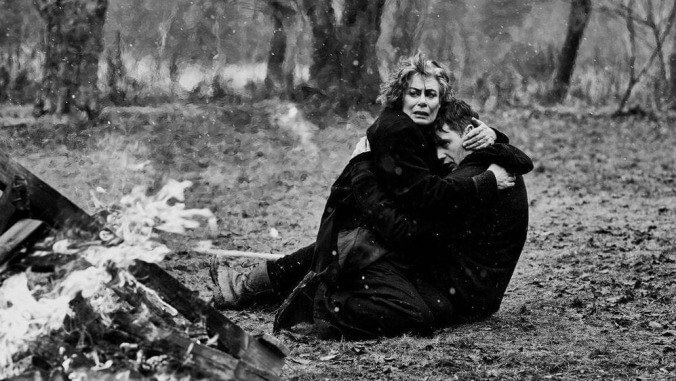For The Righteous, it’s not a sin to fall short of your ambitions
Mission: Impossible’s Henry Czerny plays a priest whose past literally comes back to haunt him in Mark O'Brien's thriller

Around the halfway point of writer-director Mark O’Brien’s religious-themed thriller The Righteous, ex-priest Frederic (Henry Czerny), tortured by sin, is told by a current man of the cloth, “What’s important is knowing the difference between what’s real and what our conscience has created to punish us.” O’Brien’s film lives precariously in this gray area as the personification of Frederic’s guilt—and the key to his penance—winds up sleeping on his living room couch.
The Righteous is O’Brien’s feature directing and feature screenwriting debut, and he also plays the mysterious visitor with a connection to Frederic’s errant past. O’Brien, known primarily as an actor (Ready Or Not), is nothing if not an earnest and determined multi-hyphenate, and The Righteous is an extremely polished, low-budget production. It’s steeped in a grave sense of portentousness that burrows under your skin. The issue is the weighty script, bleak and heavy with apocalyptic consequence, which contains undeniably intriguing notions that are often not satisfactorily explored or don’t quite cohere. Still, O’Brien falling short of his ambition is a sin we can live with, and The Righteous works as a supernatural chamber piece and brain-tickling religious dialectic wrapped in chilly black-and-white visuals.
At the outset, we’re told that Frederic (Czerny) suffers from “mind lapses and spells,” which puts us on notice that we’re in the hands of an unreliable narrator. The grieving Frederic has just buried his recently deceased adopted daughter, when a limping stranger (O’Brien) collapses on his property in the middle of the night. Frederic, presumably never having seen the Robert Redford episode of The Twilight Zone, invites him inside much to the dismay of his wife, Ethel (Mimi Kuzyk). While tending to the injured man’s immediate needs, suspicions are piqued with each of his vague utterances: He christens himself Aaron, which Frederic believes is a lie. Frederic’s also not buying Aaron’s shaky explanation of how he wound up in such a remote and desolate patch of nowhere.
Aaron is an unnerving presence with a sweaty, trickster energy and a creepy Southern drawl. His solicitous charm can turn dark and menacing in a snap and O’Brien plays it to the slithery hilt. Aaron is the story’s engine, teasing out clues to his identity and purpose and drawing out information from a troubled former clergyman with more to hide than the audience initially knows. Those secrets are hardly flattering and manage to strafe the topic of impropriety within the Catholic church. Whether we should condemn Frederic for his sins or forgive him because he’s so desirous of punishment is not a choice we’re asked to make. O’Brien’s sympathy clearly rests with the morally compromised penitent, even if the veteran Czerny (so good in 1992’s The Boys Of St. Vincent) doesn’t completely earn our compassion. His existential cries for penance at the beginning become less effective as they start to sound like the pissed off grouses of upper management.

 Keep scrolling for more great stories from A.V. Club.
Keep scrolling for more great stories from A.V. Club.